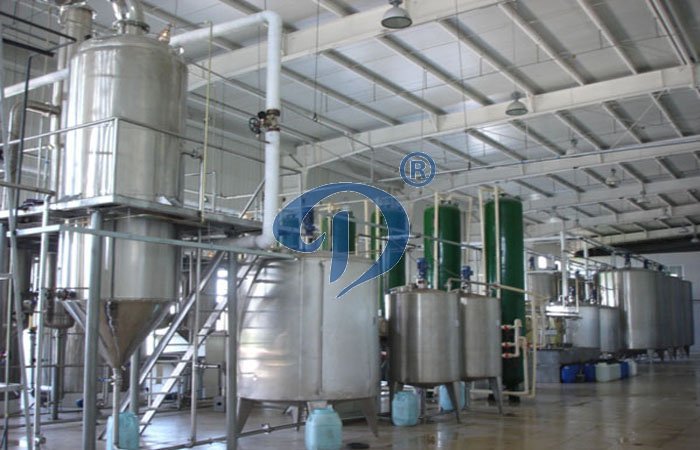 Tel/WhatsApp
Tel/WhatsApp
what is maltose syrup?
Also known as malt sugar, maltose is formed by uniting two units of glucose that provide the first link in a process that eventually results in the creation of starch. It is an important component in the process of creating fermented barley that in turn can be used to brew beer. Adding in a third unit of glucose produces a sugar that is known as maltotriose, while further units make it possible to produce maltodextrins. All these steps create concentrations of sweet product that can be used in a number of different food applications, in addition to producing beer.
Creating maltose in nature is not difficult at all. Using barley as the base, the process begins with allowing the grain to germinate. After a certain amount of time, which varies depending on how the malted barley will be used, it is heated to stop the germination process. Malting the germinated barley helps to increase the concentration of amylase enzymes in the material. When the grain is combined with water and heated, the amylase breaks down the starch in the grain to produce maltose.

Syrup production machine
The produced maltose is added to yeast as the fermentation process continues. Water-soluble sugar forms and when introduced into the liquid stages of the process helps to release both ethanol and carbon dioxide. Assuming the mix of sugar and the yeast is correct, the beer that results from the process will be smooth, full bodied, and tasteful.
Maltose can also be artificially created in a laboratory. This is accomplished by heating the medium with the addition of a strong acid for roughly ten minutes. Because heating can accelerate the process of preparing maltose for use in the creation of beverages, many large-scale producers choose to use this method as a means of creating large batches of product.
Maltose is not a substance that should be consumed as a separate sweetener in the same manner as table sugar. However, it is an excellent additive to many different types of packaged foods, including non-alcoholic beverages.
-
 Henan Jinrui Four Types of Dehydration Equipment for Cassava Processing Introduction
Henan Jinrui Four Types of Dehydration Equipment for Cassava Processing Introduction
-
 Entire chain of automatic fufu flour production line
Entire chain of automatic fufu flour production line
-
 Functions and advantages of centrifuge sieve in potato starch purification line
Functions and advantages of centrifuge sieve in potato starch purification line
-
 Manufacturing cycle time of Henan Jinrui's tapioca starch purification equipment
Manufacturing cycle time of Henan Jinrui's tapioca starch purification equipment
-
 How Rasper Helps Increase the Efficiency and Productivity for Starch Production
How Rasper Helps Increase the Efficiency and Productivity for Starch Production
-
 Advantages of Henan Jinrui's Flash Dryer for Cassava Flour and Starch Production
Advantages of Henan Jinrui's Flash Dryer for Cassava Flour and Starch Production
-
 How Much Workshop Area is Needed for a Cassava Flour Plant? How to Place the Layout?
How Much Workshop Area is Needed for a Cassava Flour Plant? How to Place the Layout?
-
 How to Ensure the Smooth Operation of Starch Processing Equipment?
How to Ensure the Smooth Operation of Starch Processing Equipment?
-
 Common bottlenecks and solutions of cassava flour production
Common bottlenecks and solutions of cassava flour production
-
 Daily maintenance routine for cassava flour processing machines
Daily maintenance routine for cassava flour processing machines
-
 Doing Factory Ships High-Quality Garri Processing Equipment to Nigeria
Doing Factory Ships High-Quality Garri Processing Equipment to Nigeria
-
 Selling High-Quality Cassava Processing Equipment to Uganda
Selling High-Quality Cassava Processing Equipment to Uganda
-
 Gari processing line successfully shipped to Nigeria
Gari processing line successfully shipped to Nigeria
-
 Cassava starch fine fiber sieve purchased by Indian client
Cassava starch fine fiber sieve purchased by Indian client
-
 Gari making plants were transported to Ghana from Henan Jinrui’s factory
Gari making plants were transported to Ghana from Henan Jinrui’s factory
CONTACT US
DOING company offers cassava processing machine from single machine to the complete production line. If you want to get more details about cassava processing machine, please contact us:
- Do you want to buy machine?
- Yes, I want to buy machine
- No, I Just learning
- What is your raw material?
- Cassava
- Potato
- Sweet potato
- Others
- 2. What is the final product you want to produce?
- Garri
- Cassava flour
- Cassava starch
- Cassava chips
- Attiekie
- Bammy
- Others
- 3.What is your capacity plan?
- Small scale garri machine
- 1ton per day
- 2tons per day
- 3tons per day
- 10tons per day
- 20tons per day
- Others
- 3.What is your capacity plan?
- Small scale
- 5tons per day
- 10tons per day
- 20tons per day
- 50tons per day
- 100tons per day
- Others
- 3.What is your capacity plan?
- Small scale
- 5tons per day
- 10tons per day
- 20tons per day
- 50tons per day
- 100tons per day
- 200tons per day
- 300tons per day
- Others
- 3.What is your capacity plan?
- Small scale
- Middle type
- Large scale
- What is your capacity plan?
- Small scale
- 5tons per day
- 10tons per day
- 20tons per day
- 50tons per day
- 100tons per day
- 200tons per day
- 300tons per day
- Others








